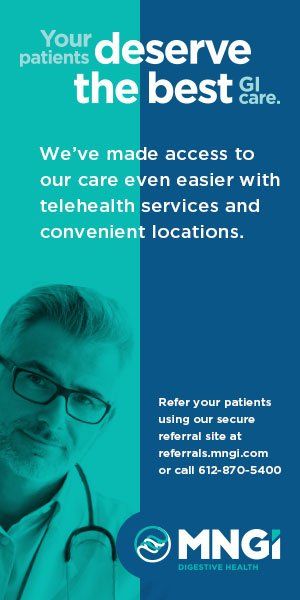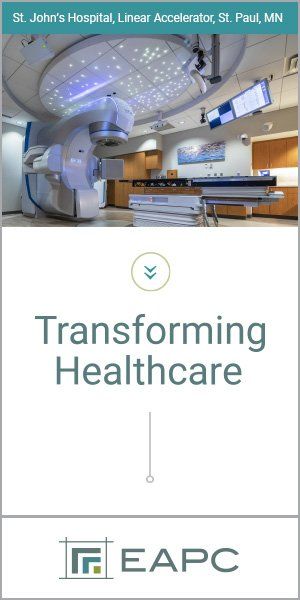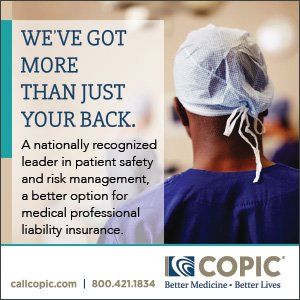Capsules
New Partnership Addresses Behavioral Health Workforce Shortage
To address the alarming shortage of mental health providers in Minnesota, where one in four jobs is currently open, UCare, Alluma, a community behavioral health clinic based in Crookston, and the Amherst H. Wilder Foundation have developed a pilot program to make it easier for prospective mental health professionals to join the field. “There has never been more urgency to address the shortage of mental health providers in Minnesota,” says Jennifer Garber, UCare vice president of mental health and substance use disorder services. “We are proud to invest in the community in this way and eventually provide our diverse members the opportunity to receive culturally appropriate mental health services.” Through the partnership, UCare will fund $100,000 in stipends for clinical interns as they complete the supervision necessary to graduate from and eventually licensed in social work, clinical counseling, marriage and family therapy and other mental health roles. Wilder and Alluma will provide thousands of hours of state mandated supervision at no cost. The pilot will focus on supporting clinical interns from cultural and ethnic minority groups, rural communities and other underrepresented populations where the workforce needs are greatest. “We know we need more clinicians from underrepresented communities and we know there are people out there who want these jobs, but the math doesn’t add up, says Dr. Pahoua Yang, Wilder’s vice president of community mental health and wellness. “Many students hoping to enter a clinical field are attending school, working a paid job, and trying to make time for a clinical internship at their own expense, all at the same time. By offering paid internships and supervision at no cost, this program will show how we can diversify and expand our mental health workforce at this critical time.” “Our frontier counties are struggling. It’s challenging to recruit providers in rural areas throughout northwestern Minnesota,” says Alluma CEO Shauna Reitmeier. “Providing students with an incentive to do this work in rural Minnesota will have a profound impact on each student and the communities that they serve. We hope that this partnership will create a ripple effect that results in organizations across the state identifying new and innovative ways to address the workforce shortage.”
Carris Health Changes Name to CentraCare
Carris Health recently announced it is changing its name to CentraCare for all Carris Health entities in Willmar, Redwood Falls and New London. The name change reflects a cohesive focus as Carris Health and CentraCare have developed shared processes and strategies, including creating a Rural Health division, since Carris Health was formed in 2018 as a wholly-owned subsidiary of CentraCare.
The name change will further create unity within the CentraCare organization and make it easier for community members to understand how all CentraCare sites are connected. The updated brand identity communicates more clearly that all CentraCare locations are working together to improve the lives of patients across Minnesota. “CentraCare and Carris Health were already connected through our common culture, purpose and mission,” Ken Holmen, President and CEO, said. “Now, we will also be connected through one unified name – CentraCare.”
“When Carris Health formed, we chose a different name because our rural health area was newly defined within the CentraCare family,” Cindy Firkins Smith, MD, senior vice president of Rural Health, said. “In 2021, CentraCare developed a Rural Health division, and now our system has further aligned while still focusing on the distinct needs of rural communities. Our commitment to our patients defines us, and that will not change as a result of this name conversion.” “Patients and families will benefit from this brand alignment as it makes it easier for community members to understand how each CentraCare location is connected,” said Firkins Smith. “For example, patients frequently received correspondence from both Carris Health and CentraCare, which can be confusing. A single brand name will make documents and information easier for patients to understand how we collectively work together to provide expert health care that is close to home.”
Work has already begun internally to change names and logos to CentraCare. Communities served by Carris Health will start to see changes on June 1, as the organization changes signage, appointment reminders, email addresses, patient correspondence and more. The Carris Health to CentraCare brand transition is expected to be completed over the next 12 months.
Davis Announces New Allina Lakeville Medical Complex
Davis recently announced it will begin development on a 100,500 square-foot Class A medical complex in Lakeville. The facility, named Lakeville Health, will include a multi-specialty medical center with more than 20 Allina specialties, including orthopedics, oncology, women’s health and cardiology. It will also include a new ambulatory surgery center with four operating rooms. Lakeville Health is already 100% leased, with Allina accounting for 60,000 square feet in the specialty center and 18,500 square feet in the surgery center. In addition, MNGI Digestive Health (MNGI) has signed a lease for 22,000 square feet in the facility to house a new clinic and endoscopy center. “We are grateful for our continued partnership with Davis,” says Dave Slowinske, Allina Health senior vice president, Operations. “Making complex specialty care more accessible to the south metro and providing a state-of-the-art ambulatory surgery center are critical components to Allina Health’s overall strategy to lower the cost of care while adding convenience for our patients.” MNGI’s president and CEO, Dr. Scott Ketover notes, “MNGI Digestive Health and its caregivers are excited about the new full-service endoscopy center and clinic that will be opening in Lakeville. This location will offer a wide range of gastroenterology and digestive health services, including outpatient procedures, infusion therapy and comprehensive GI care with behavioral and dietary health support. We are using innovative, state-of-the-art technology and equipment to provide the best care for our patients, and our space in this building will be fully designed for operational needs and the comfort and experience of our patients.” He added, “MNGI is looking forward to this expanded relationship with its health care partners and being a part of Lakeville and the surrounding community. This location will provide convenient access for adults seeking GI care and provides MNGI the opportunity to serve the growing base of patients in the South metro area and beyond.” Lakeville Health is expected to be completed and open to patients in fall 2023.
Gun Violence a Public Health Crisis
Health care leaders across Minnesota joined together recently to express their shared view that gun violence is a public health crisis. Health care systems share a unique perspective on this growing crisis and the impact the lives lost and those forever changed by gun violence has on the health and well-being of our communities. To address the epidemic of gun violence both locally and nationally, Minnesota’s health care systems have pledged to collaborate and take action on the development of solutions to prevent gun violence and advance important conversations on reforms to protect patients, employees and communities. The CEOs from Allina Health, CentraCare, Children’s Minnesota, Essentia Health, Fairview Health Services, Gillette Children’s, HealthPartners, Hennepin Healthcare, North Memorial Health and Sanford Health have released the following statement: As leaders of some of our state’s health care systems, we believe it is time to declare gun violence as a public health crisis and to work to prevent the deaths of innocent people of all ages and backgrounds. We must look no further than the recent shootings on a hospital campus in Tulsa, Oklahoma, at a school in Uvalde, Texas, a grocery store in Buffalo, New York, and countless others just this year to see its devastating impacts. According to the Centers for Disease Control and Prevention, in 2020 more than 19,000 American lives were lost due to homicide involving a gun. That same year, guns became the leading cause of death for children and teenagers. These statistics are appalling and outrage us as health care providers and should outrage us all. Everyone deserves a world where they can feel safe and live their lives without fear of gun violence. Gun violence and its horrific impacts are preventable. It has reached epidemic levels and represents a significant threat to public health. As health care providers, we see the impacts of gun violence firsthand every day. We uniquely understand the devastation of this violence in our hospitals and clinics and the toll it takes on individuals, families, communities and the care providers who treat the victims. We have an important role to play in creating a safer future for all. We will continue to be fierce advocates for the safety of our employees, patients and the communities we serve, inside and outside our hospital and clinic walls. By formally declaring gun violence as the public health crisis that it is, we will collectively seek the solutions required to save lives and stem the tide of violence.
$2 Million in DEED Grants to Help Certify Internationally Trained Health Care Workers
Minnesota Department of Employment and Economic Development (DEED) recently announced recipients of the Internationally Trained Professionals Competitive Grant Program to help fill in-demand health care positions. This program helps internationally trained health care workers earn the professional licenses required to do similar work in Minnesota–which will lead to more qualified health care workers available for this critical sector of the workforce. Health care is the largest industry in our state–as of the fourth quarter of 2021, there were more than 52,000 Health Care & Social Assistance job vacancies in Minnesota, accounting for about one in every four vacancies in the state. This is the largest number of vacancies ever reported, surpassing the peak set in the second quarter of 2021, and by that measure, demand for health care workers has never been higher in the state. The program is granting up to $400,000 over two years to seven organizations to assist internationally trained health care professionals in gaining licensure. Eligible organizations include state or local government units including two or four-year post-secondary institutions, nonprofit/community-based organizations, community action agencies or labor organizations physically located in Minnesota and with experience serving immigrant and refugee populations. Immigrants and refugees are critical to Minnesota’s economy and the state is home to more than 470,000 foreign-born residents. Over the past ten years nearly 105,000 new immigrants and refugees have moved to Minnesota. Foreign-born workers now account for over 10% of the total available labor force in the state, up from 8% just one decade earlier. Over 50% of our recent labor force growth has been driven by immigrants. “During a time of low unemployment, historic job vacancy rates, and an enormous demand for health care workers, we need to empower every available skilled health care worker in the state,” said DEED Commissioner Steve Grove. “This grant program helps organizations prepare internationally trained health care workers for licensure so we can bring those greatly needed workers into health care employment across Minnesota.”
Summit Orthopedics Launches First-in-Nation Honduran Physician Training Program
Summit Orthopedics recently announced the launch of a first-of-its-kind orthopedic surgical training program for Honduran physicians. In partnership with the University of Minnesota and One World Surgery, the training program will help build orthopedic surgical capacity in Honduras by providing subspecialty training to Honduran orthopedic surgeons. “Summit has a long-standing and successful mission program through a partnership with One World Surgery in which we send our physicians to Honduras to provide orthopedic care. But we simply can’t be on the ground in Honduras as much as we’d like or as much as is needed,” said Michael Forseth, M.D., an orthopedic surgeon with Summit Orthopedics who oversees the program. “Through our new training program, we hope to ensure there is a network of orthopedic surgeons who can provide advanced orthopedic care to the Honduran population on an ongoing basis.” This is a vision shared by One World Surgery, where Dr. Merlin Antúnez, Honduran medical director and orthopedic surgeon, currently leads a team of 40 local clinical and non-clinical staff to care for patients in the community who otherwise would not have access to healthcare. This new training program launched with Summit will ensure that local staff people are available to provide care for years to come. Honduran orthopedic surgeons are trained in trauma and develop expertise in treating fractures and traumatic injuries, including car accidents or gunshot wounds. With Summit’s new yearlong training program, two Honduran physicians will participate in six months of in-person training in Minnesota and six months working alongside both Summit and local surgeons in Honduras to develop orthopedic expertise in subspecialties such as joint replacement, arthroscopic sports medicine surgery, and hand/upper extremity surgery. Upon completion of the program, the newly trained Honduran physicians will train their colleagues, further building surgical subspecialty orthopedic capacity in Honduras. Engels Castellanos, M.D., and Dolly Acosta, M.D. are the first Honduran physicians to participate in the training program after arriving in Minnesota in March. Dr. Castellanos says he looks forward to bringing the technological expertise he develops working with Summit to the surgeons in his country. “That’s the idea, that we can help our people with the knowledge we acquire here,”
MORE STORIES IN THIS ISSUE













